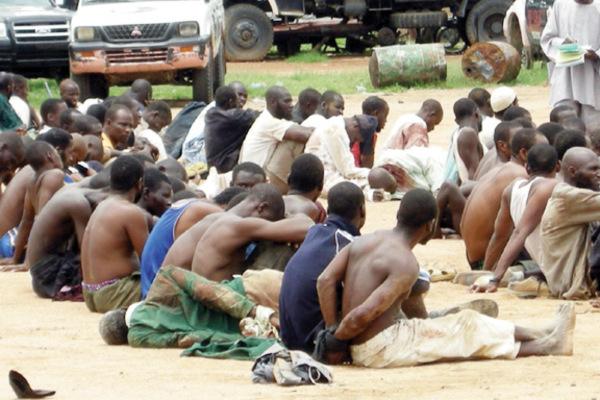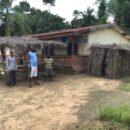Northern Nigeria Militancy: Who and what are Boko Haram?

Alleged members of Boko Haram sit after arrest in 2009 by police in Northern Nigeria
By Murray Last (University College London) – 14/07/2011
Political assassination is new neither in Nigeria nor in the history of Islam (nor indeed in Christian histories). But, in the large northern-Nigerian metropolis of Maiduguri, Boko Haram’s current campaign of assassination, both to intimidate systematically all opposition to it and to revenge itself on the authorities who sought to destroy it in 2009, is indeed new. I refer to the group as “Boko Haram” (or BH) because “Boko Haram”, though that is just its Hausa nickname, has now come to signify more than just a set of unconventional religious ideas. It is important to view the current campaign as both political and religious; though there is a religious dimension, it would be wrong to write off BH as religious “˜cranks’. Theirs is also an insurgency against the local Nigerian state which, in the eyes of BH, is secular (or at least not properly Muslim).
It is their politics that make them dangerous. The majority of those assassinated in Borno and Bauchi have been agents of governments at all levels – local dignitaries or their less protected younger brothers (the Shehu of Borno’s; the former Governor’s), policemen and now soldiers have been shot. But the campaign has also, in the name of Islamic righteousness, targeted “˜ulama who criticised BH as well as drinkers in bars, and markets where beer was sold. Assassination is done in daylight, in public, usually with impunity; it’s not surreptitious, being done with guns (AK-47s) and explosives (IEDs, car-bombs, “˜grenades’), often by men driving-by on motorbikes or riding in buses. Some targeted assassinations, however, have been carried out in private houses, by men entering on foot; an early (2007) assassination was of an imam even during dawn prayer inside his mosque (in Kano). The recent death toll is put at 150 or more. Attacks or fears of attack have now spread widely: not only in Bauchi and Adamawa but also in southern Kaduna and Abuja, in Niger and Kogi states; even Lagos has tried screening all bus passengers as they board, and major bridges (such as those near Lokoja) are under guard all night.
The Carrot
As the Nigerian constitution allows citizens to believe in whatever religion (or version of religion) they like, mere membership of BH, if it is treated as a religious group, is technically not illegal. Hence the courts cannot convict people of merely belonging to or supporting BH; at worst they release them on bail or hold them indefinitely “˜awaiting trial’. In consequence the police and army tend to shoot the men they suspect as ‘terrorists’ rather than arrest them. In doing so, civilians who happen to be “˜in the way’ are apt to get hurt too. The new Terrorism (Prevention) Act may make it easier for the police to class BH as a terrorist organisation, but till recently the police are reported to have been trying “de-radicalisation” and “moral suasion” (whatever that might entail) on some hundred suspects they took in raids. This is presumably the “˜carrot’ of the President’s “carrot and stick” policy towards Boko Haram. How far it will work is of course uncertain, since it is permissible, Islamically, to feign submission in order to survive. At root, however, it is not the business of the Government to convert BH to the “˜true faith’; it is to bring an end to the violence.
If we are to analyse BH as primarily a political (and criminal) insurgency against the state – since it is on this basis that the Nigerian government is acting – then what are BH’s political demands? BH is of course demanding the state becomes properly Islamic, with shari’a law fully implemented &c., but more immediately they are also demanding that all their supporters be released from jails and all their followers be given an amnesty. Meanwhile, BH has attacked jails in Bauchi and Yola to free their members and all other prisoners. The army calls BH “˜cowards’ for not coming out and fighting openly, but BH’s aim, in so far as I can make sense of it, is not for a show-down (which they would obviously lose again) but to get themselves recognised, by at least the Borno state, and to be allowed to continue, unmolested by the police or the SSS, with their preaching (however unorthodox) and their recruiting. This aim has recently been practicable because there have been statements from the Borno State government which suggest dialogue with BH is indeed the way forward; Gen. Buhari has said much the same. And the former Governors of both Borno and Bauchi have published apologies for wrongs that may have been done to BH supporters during their governorships: BH had demanded such an apology, but its spokesman has also specified conditions before any talks can begin.
The Stick
The military have a different strategy: theirs is the President’s “˜stick’ – in the form of a Joint Task Force combining army and police in an Operation Restore Order. Checkpoints have been set up; initially motorcyclists had to dismount 500 yards from the checkpoint, but now all motorcycles are totally banned within Maiduguri Metropolitan and Jere LGA (the Borno government is replacing their role in everyday transport, it says, by providing 5000 motorised tricycles and 100 buses). Now that the army is patrolling, it too is under attack from BH: in response, the army’s de facto policy is to kill not only anyone who attacks them but also, possibly, those whom they suspect may have been “˜sheltering’ the attackers. These supposed sympathisers or “˜supporters’ of BH, living as they must either as residents of dense low-cost housing or as petty traders among the stalls that line Maiduguri’s roads, pose a problem to the army and police as they rush in pursuit of whomever they believe shot at them: locals are simply categorised as BH and they and their premises are at risk. This is understandable as neither the army nor the police have had experience before of sustained urban counter-insurgency among their own fellow-citizens.
The real danger of this policy is that it will antagonise even more of the local population (whether sympathisers of BH or not) who are too poor to leave town. Those who can leave are indeed doing so, closing shops and homes – even the University has been closed: Maiduguri is a battle-ground, they say. Hence local politicians’ broader concern to negotiate a return to peace before there is a major popular “˜rising’, not from BH alone but among young urban unemployed for whom the political class (and its agents) as a whole is anathema.
A discontented North
The contested loss, in the recent election for President, of the one candidate who is truly loved by the northern “˜masses’ – Gen. Muhammad Buhari; he’s seen as having all the right characteristics of a true Hausa leader, a mutumin kirki – has increased the level of anger on the street. Were this scenario (of a wider “˜rising’) to develop in the long term, BH might by then have metamorphosed into a kind of political brand of the sort al-Qaeda was in its heyday, but an al-Qaeda without an Osama bin Laden: it’d be for some just an attitude of mind, for others an active policy but for all it’d be a widespread network of sympathisers, a focus for unity built upon an angry consensus and a common sense of disenchantment with the entire Nigerian project as it is now run. BH has no obvious leader; there is only a spokesman, though now there is even an (unofficial?) blogsite which is in English, not Hausa or Arabic (and seemingly coming out of Kaduna). But were a leader with real charisma to emerge sometime somewhere (but probably not out of BH as it now is), then he might be seen as a mujaddidi (the reformer who comes every century and puts the whole Muslim umma back on course) or even perhaps the Mahdi. Many (Muslims and Christians alike) are aware that the world’s end, the end of time, may well be near. So far, BH seems nowhere near such a metamorphosis; it remains only a remote possibility that BH could set the grass-roots seriously on fire. Nonetheless politicians need to be on stand-by, in case sparks fly.
This widespread “˜panic’ or terror over BH’s campaign of violence has led to any major attack, anywhere in the north – whether on a bank, a police station, a government building, or simply on individuals – being attributed to the group. The perception of both BH’s ferocity and its ubiquity has therefore grown in recent weeks. The police often try to counter this by saying that in their estimation it was an act of armed robbers or hitmen hired to settle a dispute. As no one is caught, we do not know for sure who is to blame: BH does not always claim the attack – but even if they do, is the claim credible?
It is surely in BH’s interest to increase their fearsome (but “˜righteous’) image; and criminal gangs can hide behind that image and put any police hunt off the scent. Recent examples of these attacks of “˜uncertain origin’ include the murders of two (Christian) merchant brothers in their house, purportedly by men defaulting on their debts; another was a fire at a government vaccination centre; a third, in southern Katsina, was a bank raid (on the formerly Islamic Bank PHB) and a shooting-up of a police station, both in Kankara town. This last could be linked to other, earlier signs of Islamic activists in southern Katsina, but we have no evidence: historians will be hard put to plot the rise and spread (and ultimate fall?) of BH. Instead, we will identify “˜hotspots’, many of which will be marked by Christian/Muslim conflict, such as happened very recently in Suleja. BH as an organisation, I suspect, had nothing to do with the burning of churches there; but there will be many who will use the apparent success of BH to justify carrying out their own brands of violence. In short, the BH “˜infection’ may spread and create what seems an epidemic of violence when in fact the various incidents are independent outbreaks that need to be analysed – and controlled or pre-empted – locally. The original BH was never specifically targeting Christians but in certain hotspots the local BH “˜franchise’ may indeed choose to specialise in vendettas of this kind.
Some unanswered questions
1. Is BH funded or getting weaponry, training, even recruits from abroad? One can assume that links abroad have been sought, but BH is still short of weapons: it continues to use dangerous raids on police stations to acquire guns and ammunition. Furthermore, it is using explosives as never before but, it seems, in not very sophisticated devices: so someone has been learning new technologies somewhere. Access to the internet is easy, as much for BH as for anyone.
2. Is BH expanding its operations, is it membership growing? As suggested above, the current panic gives the impression that it is, and indeed that it might still grow even once the present military campaign against BH is over. Past history of such radical groups (such as the “˜Yan Tatsine) suggests they do usually have a large penumbra of sympathisers who lie low “˜below the radar’; and some of those sympathisers either provide some finance or are in positions of power that could moderate government policy towards BH. As BH modifies its public position on a range of issues, so its wider public appeal will change.
3. Has BH sent suicide-bombers against targets? The one possible instance is the car-bomb, set to explode in the police’s HQ in Abuja, which killed the car’s driver, but it may well have been that the device went off prematurely – did the bomb’s timer, for example, not allow for Abuja’s sometimes sluggish traffic? Or did the driver panic once near his target and set the bomb off before he could get out? We will never know for sure, but in general there do not seem to have been specifically “˜martyrdom missions’, though any operation against police or army poses risks of “˜martyrdom’.
4. Finally, how novel is BH? My answer is that as a radical group it is far from a new phenomenon. It is however modern. What distinguishes it from colonial and pre-colonial groups is [a] it is based in cities, not in “˜camps’ deep in the countryside, and is dispersed within cities; [b] it is using assassination, guns and explosives; [c] it is using mobile phones, motorcycles, cars. In short, despite slogans such as “˜boko haram’ (“˜westernisation is wrong’), it is not an arcane throw-back: it is modern and dangerous. In northern Nigeria’s distant past such groups have occasionally led successful revolutions – but they have had charismatic leaders, their stance was non-violent until jihad was forced upon them, and over time their grass-roots support was enough to enable them survive famine and defeat. BH is not a movement of that calibre; and Nigeria has the resources and the skills to defeat it. But it will not be the last of such groups.








[…] African Arguments, Murray Last has created an glorious backgrounder on Nigeria’s Boko Haram movement. One critical […]
I have no interest whatsoever in knowing who these people are, what twisted ideology informs their beliefs, or who funds them. What interests me, however (and it has become very clear), is that it enjoys the support of most muslims in northern Nigeria, at least insofar as the emirs and sultans speak for their people. Therefore, the only question is why they are not allowed to exercise their human right to self-determination, which implies the right to live in a pseudo-theocratic, pre-medieval dystopia of their own conscious creation. Why, in other words, is the Nigerian government wasting my oil wealth trying to indulge and appease these intolerant, murderous, anti-Enlightenment jihadists, when we should be getting serious with meeting our longsuffering people’s basic needs down south?
You say “jihad was forced upon them.” Can you elaborate?
Nigeria government should NOT over-react following the recent incident in Abuja…they need to have a cool head and open up a dialogue to engage with opposing groups by discussing their demands in a non-rhetorical manner and trying to understand the merits and background of their demands…if a tiny cultural group does not want to be part of the Western ideals then be it as long as they are not forcing anybody to take part and their separatist ideals are not violently imposed within their community….the Federal State should allow others to express their needs in a peaceful and diplomatic manner rather than shutting them out completely……The recent incident in Abuja was probably committed by internal groups who feel alien to the national community and targeting a UN building was probably a call for global media attention which does no justice at all (may God Bless the souls of those who died innocently)…However it is proper to note that the internal group now probably has international backing following the perceived negative reaction of the past from the Federal States which led to the death of one of their leaders in custody soon after his arrest (every effort should be taken to cease custody deaths in Nigeria particularly of political opponents!!!). It would have been proper to detain the leader for long so he could have been used as a channel for dialogue and more understanding of the opposing group needs!! Secession is not the right move for Nigeria BUT they just need to learn more from advanced democracy on how to cope better in protracted communities and create a better function for their changing cultural and domiciliary needs!!!.
[…] terrorism. It is obvious that the official “carrots and sticks†policy is not working. An article written 4 months ago asks pertinent questions, the answers to which might help create a sensible […]
[…] Murray (2011) “Northern Nigerian Militancy: Who and What are Boko Haram?†African Arguments, July 15 [open […]